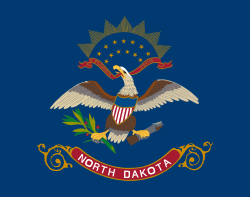North Dakota
North Dakota is a state in the United States. About 780,000 people lived in North Dakota in the year 2020. The capital and seat of government is Bismarck and the largest city is Fargo.
| State of North Dakota | |
|
| |
|
| |
| Anthem: North Dakota Hymn | |
| Map of the United States with North Dakota highlighted Map of the United States with North Dakota highlighted | |
| Country | United States |
| Before statehood | Dakota Territory |
| Admitted to the Union | November 2, 1889 (39th or 40th) |
| Capital | Bismarck |
| Largest city | Fargo |
| Largest metro | Fargo metropolitan area |
| Government | |
| • Governor | Kelly Armstrong (R) |
| • Lieutenant Governor | Michelle Strinden (R) |
| Legislature | Legislative Assembly |
| • Upper house | Senate |
| • Lower house | House of Representatives |
| U.S. senators | John Hoeven (R) Kevin Cramer (R) |
| U.S. House delegation | Julie Fedorchak (R) (list) |
| Area | |
| • Total | 70,761 sq mi (183,843 km2) |
| • Land | 59,708 sq mi (169,571 km2) |
| • Water | 1,726 sq mi (4,435 km2) 2.4% |
| • Rank | 19th |
| Elevation | 1,900 ft (580 m) |
| Highest elevation | 3,606 ft (1,069 m) |
| Lowest elevation | 864 ft (216 m) |
| Population (2019) | |
| • Total | 762,062 |
| • Rank | 47th |
| • Density | 10.73/sq mi (4.13/km2) |
| • Rank | 47th |
| • Median household income | $61,843 [3] |
| • Income rank | 19th |
| Language | |
| Time zones | |
| most of state | UTC−06:00 (Central) |
| • Summer (DST) | UTC−05:00 (CDT) |
| southwest | UTC−07:00 (Mountain) |
| • Summer (DST) | UTC−06:00 (MDT) |
| USPS abbreviation | ND |
| ISO 3166 code | US-ND |
| Trad. abbreviation | N.D., N.Dak., Nodak |
| Latitude | 45° 56′ N to 49° 00′ N |
| Longitude | 96° 33′ W to 104° 03′ W |
| Website | nd |
Geography
North Dakota is south of Manitoba and Saskatchewan, east of Montana, north of South Dakota, and west of Minnesota. Manitoba and Saskatchewan are provinces - part of Canada. Montana, South Dakota, and Minnesota are other states of the United States.
Weather
North Dakota is not close to any big bodies of water (oceans or seas). Because of this, temperatures in North Dakota are very hot in the summer and very cold in the winter. In the summer, there are sometimes strong thunderstorms. These storms can have tornadoes and hail.
History
Before European people came, Native American people lived in the area now called North Dakota. One important tribe was the Mandan.
North Dakota was one of the last US states to be settled by people of European ancestry. (To have people go there to make homes and live.) On November 2, 1889, North Dakota (and South Dakota) became part of the United States.
Economy
Most of the economy is based on agriculture. The most important agricultural crops are durum, a type of wheat, which is grown all across the state. In the Red River Valley, there is more rain, and maize (corn) and sugar beets are grown as well. In the Badlands, there is less rain, and more cattle are raised than crops.
North Dakota has the only bank in the United States that is owned by the state. The Bank of North Dakota is where all of the money from all government agencies is held. Most banks in the United States are guaranteed by the FDIC (acronym for Federal Deposit Insurance Corporation.) The FDIC guarantees that people will not lose money if a bank fails. But the Bank of North Dakota is insured by the state of North Dakota.
North Dakota Media
- Fort Union Trading Post NHS.JPG
- 2009-0521-ND-StateCapitol.jpg
North Dakota State Capitol, featuring an Art Deco tower
- 2016-america-the-beautiful-quarters-coin-theodore-roosevelt-north-dakota-uncirculated-reverse.jpg
The Little Missouri River and Theodore Roosevelt National Park appear with Roosevelt on the reverse of the 2016 America the Beautiful quarter.
- North Dakota Köppen.svg
Köppen climate types of North Dakota (SVG version)
- North Dakota population density 2020.png
North Dakota population density
Ethnic origins in North Dakota
- North Dakota Counties by race (2020 census).svg
Map of counties in North Dakota by race, per the 2020 US Census.
Related pages
References
| Wikimedia Commons has media related to Lua error in Module:Commons_link at line 62: attempt to index field 'wikibase' (a nil value).. |
- ↑ 1.0 1.1 Lua error in Module:Citation/CS1/Utilities at line 38: bad argument #1 to 'ipairs' (table expected, got nil).
- ↑ 2.0 2.1 Elevation adjusted to North American Vertical Datum of 1988.
- ↑ Lua error in Module:Citation/CS1/Utilities at line 38: bad argument #1 to 'ipairs' (table expected, got nil).


